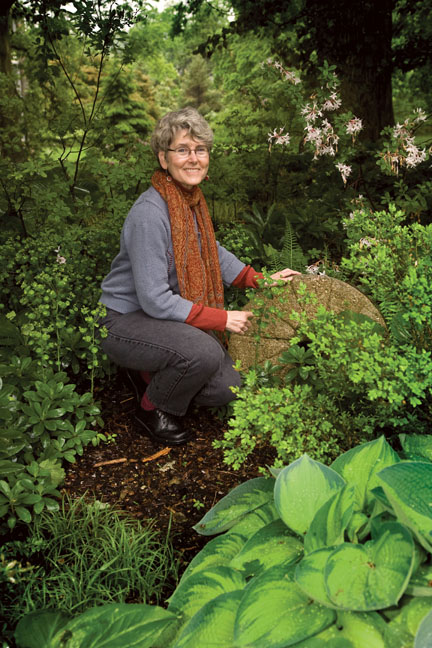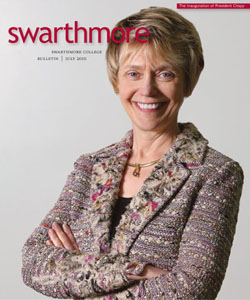The Mysteries of Poetry
NATHALIE ANDERSON

Nathalie Anderson is professor of English literature and director of Swarthmore’s Creative Writing Program.
POET AND LIBRETTIST NATHALIE ANDERSON is professor of English literature and director of Swarthmore’s Creative Writing Program. Her first book, Following Fred Astaire, won the 1998 Washington Prize from The Word Works, and her second, Crawlers, won the 2005 McGovern Prize from Ashland Poetry Press. A third collection, Quiver, will be published in fall 2010 by Penstroke Press. A 1993 Pew Fellow, she serves currently as poet in residence at the Rosenbach Museum and Library in Philadelphia.
In collaboration with composer and Associate Professor of Music Thomas Whitman ’82 and Philadelphia’s Orchestra 2001, Anderson has written libretti for three operas: The Black Swan, Sukey in the Dark, and an operatic version of Sir Arthur Conan Doyle’s short story “A Scandal in Bohemia.”
A native of Columbia, South Carolina, Anderson received a B.A. from Agnes Scott College, an M.A. from Georgia State University, and a Ph.D. from Emory University. She joined Swarthmore’s faculty in 1982. We spoke in her office during April, National Poetry Month.
Your poems explore the mysteries of human experience. What’s most mysterious within your own experience?
Your family is what forms you. My mother died when I was quite young, and I have no recollection of her. But she remained in my life as a presence—an immensity. Our parents are monuments in our minds, and we know them in a symbolic way. That’s where I write from.
Do poems just come to you?
Ideas come to me, and early on in my writing life I had a facility for bringing things to closure neatly. But that’s not how I write now. I felt that I wasn’t exploring my ideas deeply enough—not discovering what I didn’t know that I didn’t know. So now I write towards a poem.
Where do your words come from?
I read a lot. Plus, I have a great thesaurus that I picked up in England. Exploring it helps me create what I call “word hordes”—lists of related words, some of which I don’t know—so I go to the dictionary to learn them. When exploring an idea, I might typically end up with two or three pages of just words. They spur me to different thoughts, down different paths.
You’re usually very soft-spoken. What makes you scream and shout?
Thoughtlessness—others’ and my own.
How do you find time to write?
I don’t write during the semesters when I’m teaching. I try to jot down ideas—a few lines or a question that I might want to research further. These go in a folder for later. Then, when I have time to write, I take a disciplined approach. I write every day, treating it as a job. It’s the work I do.
Describe your writing process.
When I have a new idea to explore, I begin with free writing, just playing with words and metaphors. I’ll do that for maybe a half hour, then put it aside. The next day, I’ll do another half hour of free writing on the idea, then look back at what I wrote the day before. I’m just exploring the terrain at first.
I also like to have some direct physical experience of some of the metaphors that emerge. For example, if I were to write “Her heart was as cold as ice,” I might explore how cold ice feels—in my hands, on my feet or cheek, in my mouth. We think we know these things, but sensory research makes it fresh.
In writing, is there a difference between “art” and “craft?”
Contemporary writing programs talk a lot about the “craft” of writing, as if there’s a difference between the art and the craft. I think it’s a specious difference. It pits the transcendent against the practical. I don’t think of the craft as being separate from the art in what I do.
Whose music is the soundtrack of your life?
Leonard Cohen’s. I love his ironic, poetic stance—and I’ve been to every Leonard Cohen concert I could get to.
What does it mean to be “from the South?”
I grew up there during the civil rights movement, so I developed a keen sense of injustice. The place and the climate shape you—the insect sounds, the heat and humidity. When I go back, I find myself both rooted and uncomfortable. Edward Said [the Palestinian-American literary theorist] talks about the choices we make in life and how they take us from “filiation” for our fatherland to “affiliation” with new positions and attitudes. That’s what I hope I’ve done.
In Following Fred Astaire there’s a series of poems about phobias. Are you afraid of all those things?
No, of course not—not of any of them. Yet to write about nephophobia [fear of clouds], I had to understand how that fear might arise. So I lay on my back and sought a direct experience of clouds—their shapes, their movements, the feeling of their shadows.
You’ve taught courses on the mystery novel. What’s their relationship to poetry?
I don’t think there’s a direct relationship. But in a mystery, there’s something satisfying about the secrets we might figure out. The reader is kept from an answer and then discovers it. We can’t know everything in life, and in a small way, a mystery novel is a way of taking control of the chaos. Poetry perhaps sustains that mystery, lives with that chaos.
Are you a religious person?
The poetry that I tend to read makes me look at the world differently and pushes me headfirst into
it. I hope for that in my own work as well—for readers to see and experience life more intensely. It’s a form of mindfulness, I guess, in the Buddhist sense. I know a lot of Buddhists, and I experience that feeling of mindfulness myself sometimes, but I can’t put it in terms of a religious system.
 Email This Page
Email This Page